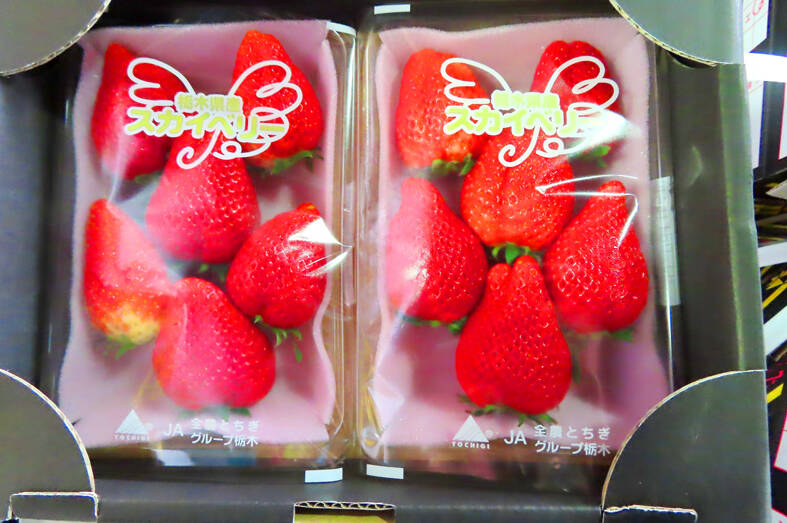Taiwan plans to allow all imports of Japanese food and agricultural products from areas near the crippled Fukushima Dai-ichi nuclear power plant, the Food and Drug Administration (FDA) said on Tuesday evening.
The FDA said in a statement that it is planning to amend regulations to allow mushrooms, the meat of wild birds and other wild animals, and “koshiabura” (foraged vegetables) from Fukushima, Gunma, Chiba, Ibaraki and Tochigi prefectures to be imported.
Apart from those products, Taiwan lifted a ban on food imports from the five prefectures in 2022.

Photo courtesy of the Food and Drug Administration
All food imports from the five prefectures would undergo batch-by-batch inspections under the amended regulations, and radiation readings and certificates of origin would also be required, FDA Deputy Director-General Lin Chin-fu (林金富) said.
More than 235,000 batches of Japanese food have been inspected for radiation at the border since the disaster in 2011, Lin said, adding that only trace amounts, which met Taiwan’s and Japan’s standards, were detected.
As food safety has been confirmed and given that most countries have already lifted restrictions on food products from the five prefectures, Taiwan would remove its import control measures for Japanese products, he said.
Forty-nine of 53 countries and regions that import Japanese food products have completely lifted control measures imposed after the disaster, Lin said.
A 60-day review period is in place and public feedback on the amendments is welcome, the FDA said.
In addition, seafood, mushrooms, tea, dairy products and baby food from areas outside the five prefectures, such as tea from Shizuoka Prefecture, would no longer require radiation certification, it said.
Only proof of origin would be required for those products, the FDA added.
Mai Fu-der (麥富德), a professor at Taipei Medical University’s Department of Biochemistry and Molecular Cell Biology, yesterday said that wild mushrooms and fowl are more susceptible to environmental exposure, and were more exposed to radiation than other agricultural products.
However, the FDA said such food was rarely imported before, so lifting the restrictions was more of a gesture of goodwill, he said.
Provided there is enough staff to examine the products batch by batch and imports remain low, there is comparatively little risk in lifting the restrictions, Mai said.
As it has been more than a decade since the Fukushima Dai-ichi nuclear power plant disaster, and the half-life of caesium-137 is 30.17 years, any risk has significantly decreased, he said.
However, Mai said that his statements were predicated on the FDA’s ability to implement its stringent standards and having sufficient personnel to screen Japanese imports.

SECURITY: As China is ‘reshaping’ Hong Kong’s population, Taiwan must raise the eligibility threshold for applications from Hong Kongers, Chiu Chui-cheng said When Hong Kong and Macau citizens apply for residency in Taiwan, it would be under a new category that includes a “national security observation period,” Mainland Affairs Council (MAC) Minister Chiu Chui-cheng (邱垂正) said yesterday. President William Lai (賴清德) on March 13 announced 17 strategies to counter China’s aggression toward Taiwan, including incorporating national security considerations into the review process for residency applications from Hong Kong and Macau citizens. The situation in Hong Kong is constantly changing, Chiu said to media yesterday on the sidelines of the Taipei Technology Run hosted by the Taipei Neihu Technology Park Development Association. With

A US Marine Corps regiment equipped with Naval Strike Missiles (NSM) is set to participate in the upcoming Balikatan 25 exercise in the Luzon Strait, marking the system’s first-ever deployment in the Philippines. US and Philippine officials have separately confirmed that the Navy Marine Expeditionary Ship Interdiction System (NMESIS) — the mobile launch platform for the Naval Strike Missile — would take part in the joint exercise. The missiles are being deployed to “a strategic first island chain chokepoint” in the waters between Taiwan proper and the Philippines, US-based Naval News reported. “The Luzon Strait and Bashi Channel represent a critical access

‘FORM OF PROTEST’: The German Institute Taipei said it was ‘shocked’ to see Nazi symbolism used in connection with political aims as it condemned the incident Sung Chien-liang (宋建樑), who led efforts to recall Democratic Progressive Party (DPP) Legislator Lee Kun-cheng (李坤城), was released on bail of NT$80,000 yesterday amid an outcry over a Nazi armband he wore to questioning the night before. Sung arrived at the New Taipei City District Prosecutors’ Office for questioning in a recall petition forgery case on Tuesday night wearing a red armband bearing a swastika, carrying a copy of Adolf Hitler’s Mein Kampf and giving a Nazi salute. Sung left the building at 1:15am without the armband and apparently covering the book with a coat. This is a serious international scandal and Chinese

COUNTERINTELLIGENCE TRAINING: The ministry said 87.5 percent of the apprehended Chinese agents were reported by service members they tried to lure into becoming spies Taiwanese organized crime, illegal money lenders, temples and civic groups are complicit in Beijing’s infiltration of the armed forces, the Ministry of National Defense (MND) said in a report yesterday. Retired service members who had been turned to Beijing’s cause mainly relied on those channels to infiltrate the Taiwanese military, according to the report to be submitted to lawmakers ahead of tomorrow’s hearing on Chinese espionage in the military. Chinese intelligence typically used blackmail, Internet-based communications, bribery or debts to loan sharks to leverage active service personnel to do its bidding, it said. China’s main goals are to collect intelligence, and develop a